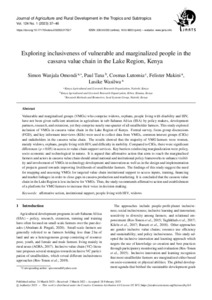| dcterms.abstract | Vulnerable and marginalised groups (VMGs) who comprise widows, orphans, people living with disability and HIV, have not been given sufficient attention in agriculture in sub-Saharan Africa (SSA) by policy makers, development partners, research, and extension, yet they comprise nearly one-quarter of all smallholder farmers. This study explored inclusion of VMGs in cassava value chain in the Lake Region of Kenya. Formal survey, focus group discussions (FGD), and key informant interviews (KIIs) were used to collect data from VMGs, common interest groups (CIGs) and stakeholders in the cassava value chain. The results showed that the majority of VMG farmers were women, mainly widows, orphans, people living with HIV, and difficulty in mobility. Compared to CIGs, there were significant differences (P< 0.05) in access to value chain support services. Key barriers reinforcing marginalization were policy, socio economic and technological in nature. It is argued that affirmative action that aims to reach the marginalised farmers and actors in cassava value chain should entail national and institutional policy frameworks to enhance visibility and involvement of VMGs in technology development and innovation as well as in the design and implementation of projects geared towards improving livelihoods of smallholder farmers. The findings of this study suggest the need for mapping and assessing VMGs for targeted value chain institutional support to access inputs, training, financing and market linkages in order to close gaps in cassava production and marketing. It is concluded that the cassava value chain in the Lake Region is less inclusive for VMGs. Thus, the study recommends affirmative action and establishment of a platform for VMG farmers to increase their voice in decision making. | eng |


